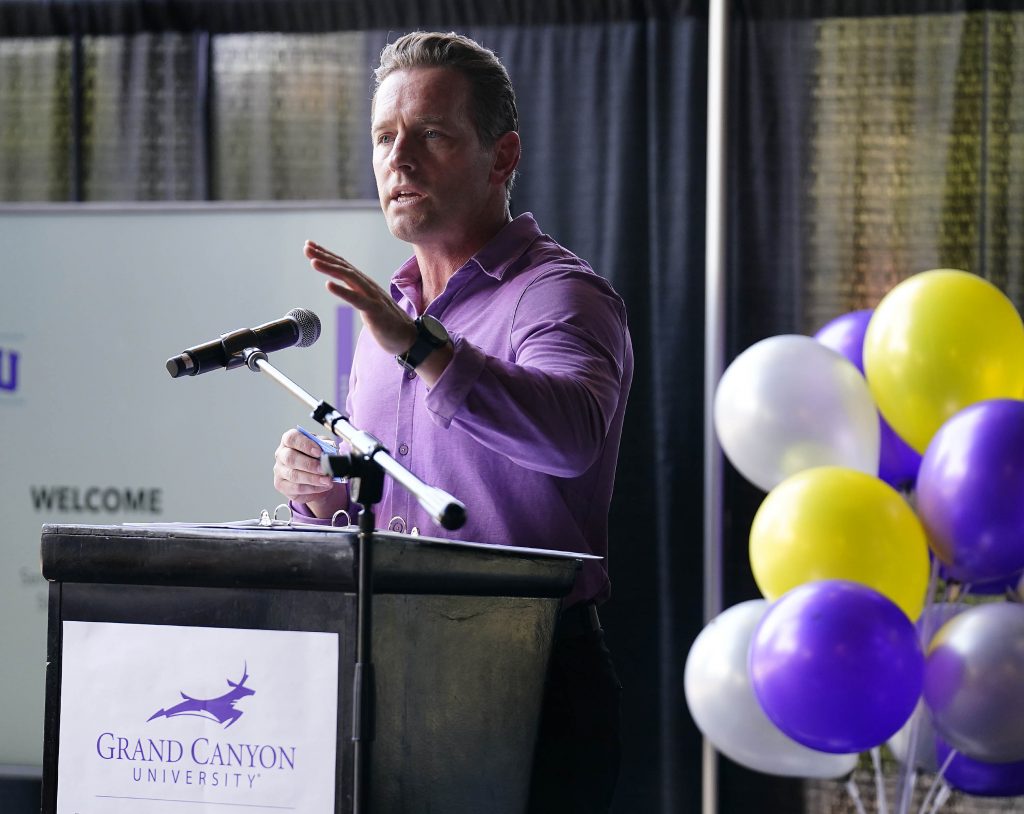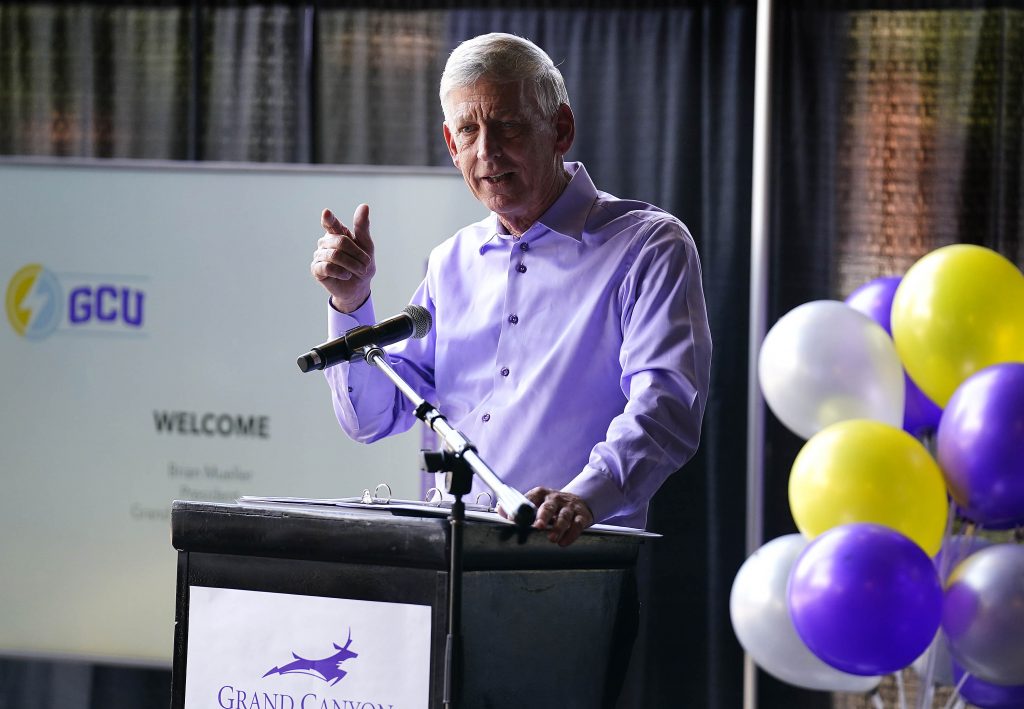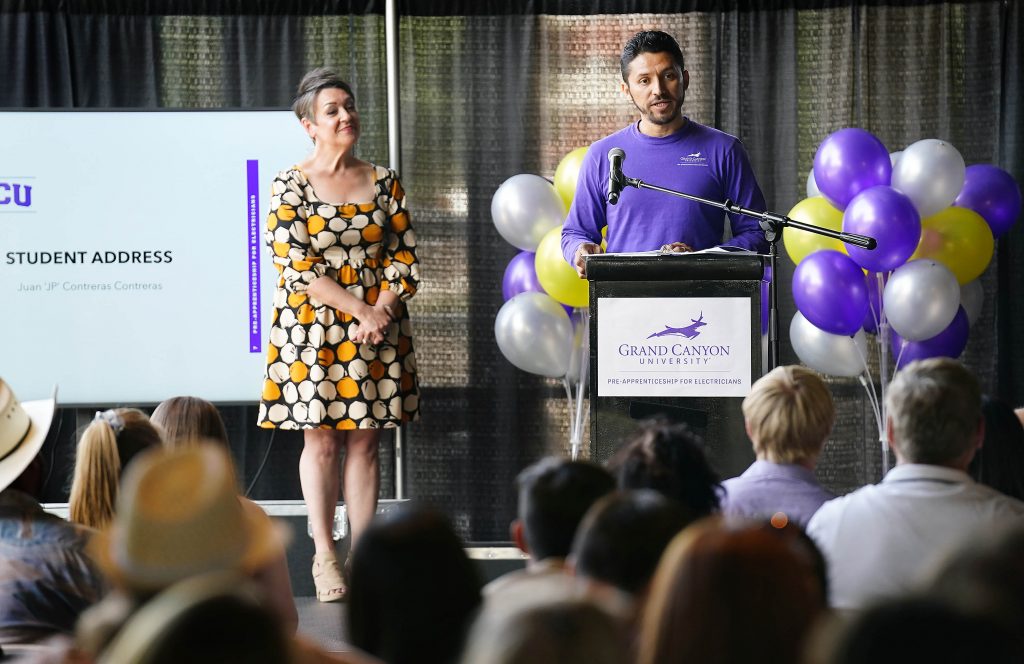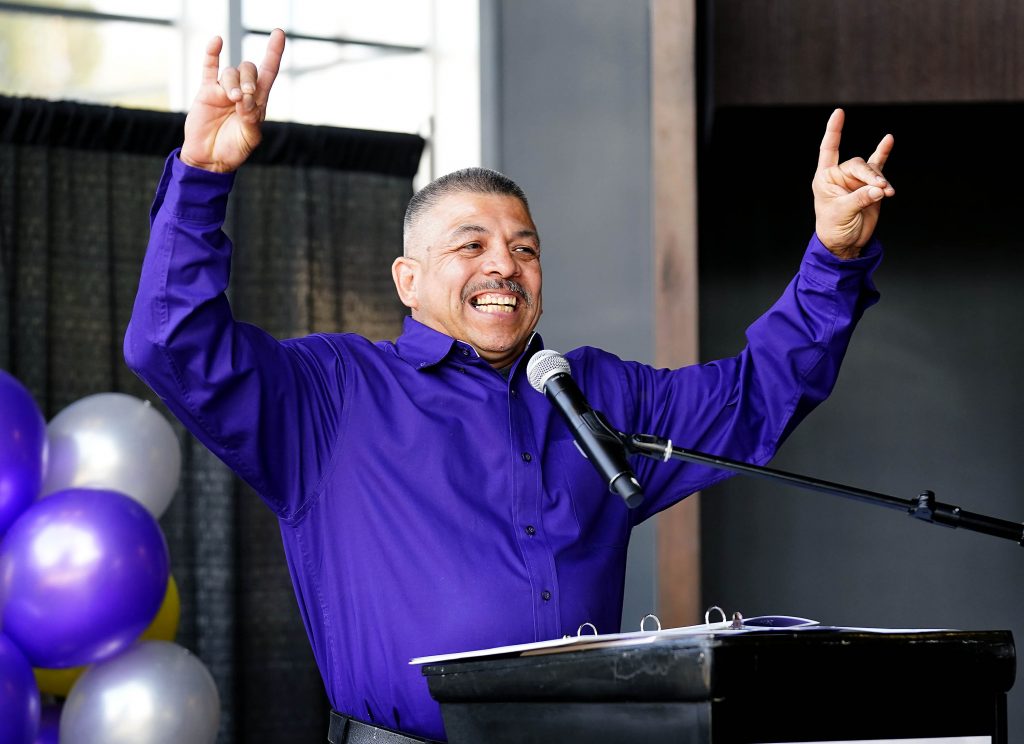
Photos by Ralph Freso / Slideshow
Roman Cota Aburto hadn’t been in a classroom in a while. He worked in a car wash.
Then he heard of the Pre-Apprenticeship for Electricians program at Grand Canyon University, a 15-week series of four courses that prepare learners to enter apprenticeships and fill a growing need.
He figured to train on wiring, conduit, that sort of thing. But math, English and history?
“We got into some history and how much electricity impacted our society,” he said. “It was prepping our minds.
“I really liked Dr. (Heather) Brody. What she helped me with is being professional. I’m using (writing skills) every day in text messages and emails.”

Like the other 34 who attended Monday night’s Pre-Apprenticeship for Electricians Night of Celebration, Aburto has completed his courses, including the English class from GCU professor Brody, and is ready for an apprenticeship. Family and friends joined for food and refreshments at the Havoc House, clapped and filmed their loved ones accepting completion certificates and learned the Lopes Up salute.
It’s the second cohort in the program, launched when Rosendin Electric CEO Mike Greenawalt and GCU leadership conceived of the idea to get more electricians into the field and expand opportunities to work in the trades.
GCU President Brian Mueller said the trades rebuild the U.S. after World War II but for some reason the prestige attributed to the profession waned.
“That needs to change,” he told the group. “The amount of construction that’s going to go on in Arizona in the next 10 years is probably going to be greater than any state in the country. In order to provide for that, we need to get today’s young people in programs like this one.
“Not everyone needs four years of college. A lot will benefit from that in our engineering programs and from our computer science and information technology programs. But for every one electrical engineer we produce here, 100 electricians are needed. And electricians are making $80,000 a year after a four-month program.”

The program is expanding with the goal of filling 80 or more spots in each fall and spring session by adding to the partnerships of Rosendin, Maricopa County and Milwaukee Tools with sponsorship from Corbins, AEC Electric, Hawkeye Electric and Salt River Project, whose representatives were on hand Monday. More information here.
“GCU’s organization is about education. It’s about educating everybody,” Greenawalt said. “Only GCU could take this program on. Only Brian Mueller could say, ‘Let’s go, we have four months to get it ready.’ And that’s pretty much what happened.”
The Pre-Apprenticeship is important today because being in the trades is not what it used to be, said Dr. Joe Veres, GCU’s Vice President of Student Success. Learners get a foundations course – “touch this, don’t touch that” – but new technology requires new skills and math to figure it out. English is needed for communicating on projects and a key to safety on sites.
“We weren’t writing essays, they learned to write an email,” said Brody, one of several GCU faculty who are teaching the courses. “At first, there were some who had their entire message in the subject line.”
But she wasn’t surprised what happened after the first-night reluctance of people who hadn’t been in class in a while, she later told the group. They worked hard, even if English usage or reading comprehension wasn’t exactly their interest.
“You showed me who you are as people and your work ethic,” she said.
It was a big night for many who completed the course.

Juan Contreras Contreras stood before his wife and four children, ranging in age from 2 months to four years, and gave an address to the group.
He told them he couldn’t dream of this night 20 years ago, when he was a mechanic in Guatemala and couldn’t even attend high school. He came to the U.S. for new opportunities in 2008 but spoke no English.
“I survived in the moment and not much beyond that. I didn’t think a career was an option for me. But after getting married and having children, it just wasn’t an option, it was a necessity for me to find a stable career,” he said.
He said his wife heard of the program and encouraged him to apply.
“So here I am. Having people who have expressed the confidence in my future to give me this opportunity fills me with gratitude,” he said.
He said it’s important to not be a burden to those around you but a help. Now, he said afterward, he not only can look forward to a career that supports his family but can look around his home and see the electricity it runs on he will be able to fix and other family he will be able to help.
Asaneth Kipchojo had similar thoughts while growing up in Kenya.
“Every time an issue came up, there was only one person who could fix it and you had to wait a month,” she said.
She was determined to become an electrician, and after moving to the U.S. seven years ago and finding this program, she can.

The diversity in the program was evident.
Thomas Fletcher is 69 and on his fourth career. He said at first that he simply needed a job for the money but learned in the program that it could be an interesting profession.
Santiago Danese Ortiz said the five in the group who became interns for GCU Facilities weren’t exactly naturals at first. But they went from screwing in light bulbs to working on new construction on campus.
“There are going to be a whole bunch of contractors coming after you because of what you’ve accomplished here at GCU,” Greenawalt told the group.
Grand Canyon University senior writer Mike Kilen can be reached at [email protected] or at 602-639-6764.
Related content:



































































